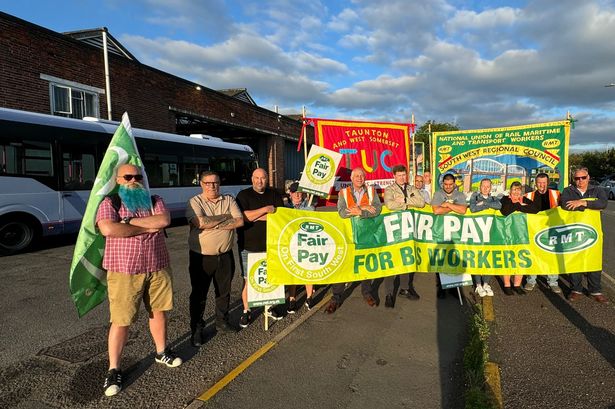Politics
Somerset Bus Workers Vote on Potential Strike Over Pay Dispute

Bus workers in Somerset are facing the possibility of strike action as members of the Rail, Maritime and Transport union (RMT) prepare to vote on industrial action. The ballot is set to take place in the coming weeks and is part of a broader trend of pay disputes impacting the bus sector across the South West region.
The RMT is advocating for its members at First South West to receive a wage increase to align more closely with their “modest goal” of £15 per hour. Eddie Dempsey, general secretary of the RMT, stated, “Bus workers at First South West are being left behind while other operators across the region pay more.” This statement underscores the frustration felt by workers who believe they deserve better compensation in light of rising living costs.
Wider Strike Action Across the Region
The potential strike in Somerset is not isolated; other regions are experiencing similar tensions. Members of the Unite union are also engaged in disputes regarding pay and working conditions. Notably, Unite members at the Brighton Bus Company and Metrobus Crawley have planned strikes on October 6 and October 15, respectively, after rejecting a pay offer of 3.5 percent. This rejection highlights a growing dissatisfaction among bus workers regarding compensation packages during a time of economic uncertainty.
In Somerset, the situation escalated recently when over 300 members of the RMT participated in a 48-hour strike, establishing picket lines in Taunton. The industrial action aimed to draw attention to their demands for fairer wages, reflecting a wider discontent among transport workers in the region.
Implications for Commuters and Local Services
The looming strike action may have significant implications for commuters relying on public transportation in Somerset and beyond. As negotiations continue, the outcome of the votes will determine whether workers will proceed with strikes, potentially disrupting bus services across the area.
Both unions are urging employers to reconsider their pay offers and engage in meaningful discussions to resolve these disputes. The outcome of the ballots will be closely monitored, as they will likely influence similar movements in other regions facing comparable challenges.
As this situation unfolds, the focus remains on the essential role that bus workers play in keeping communities connected. The outcomes of these negotiations will have a lasting impact on the livelihoods of workers and the services provided to the public.
-

 World3 days ago
World3 days agoCoronation Street’s Shocking Murder Twist Reveals Family Secrets
-

 Entertainment4 months ago
Entertainment4 months agoKate Garraway Sells £2 Million Home Amid Financial Struggles
-

 Entertainment3 months ago
Entertainment3 months agoAnn Ming Reflects on ITV’s ‘I Fought the Law’ Drama
-

 Health3 months ago
Health3 months agoKatie Price Faces New Health Concerns After Cancer Symptoms Resurface
-

 Entertainment3 weeks ago
Entertainment3 weeks agoCoronation Street Fans React as Todd Faces Heartbreaking Choice
-

 World4 weeks ago
World4 weeks agoBailey Announces Heartbreaking Split from Rebecca After Reunion
-

 Entertainment6 days ago
Entertainment6 days agoTwo Stars Evicted from I’m A Celebrity Just Days Before Finale
-

 World6 days ago
World6 days agoKevin Sinfield Exceeds Fundraising Goal Ahead of Final Marathons
-

 Entertainment3 months ago
Entertainment3 months agoCoronation Street’s Carl Webster Faces Trouble with New Affairs
-

 Entertainment3 months ago
Entertainment3 months agoWhere is Tinder Swindler Simon Leviev? Latest Updates Revealed
-

 Entertainment4 months ago
Entertainment4 months agoMarkiplier Addresses AI Controversy During Livestream Response
-

 Science2 months ago
Science2 months agoBrian Cox Addresses Claims of Alien Probe in 3I/ATLAS Discovery





















